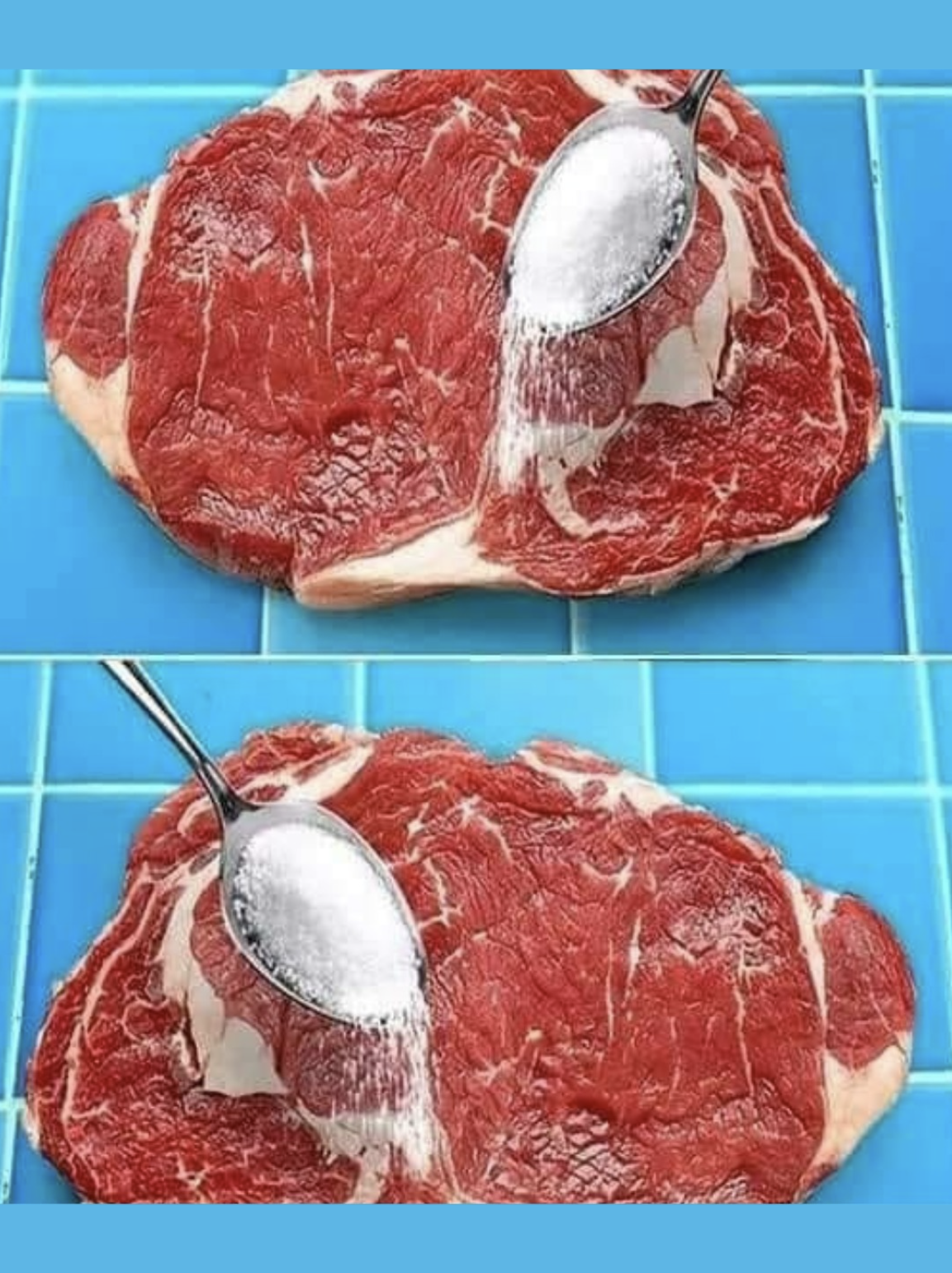🧪 How Baking Soda Works: The Science of Tenderness
Baking soda (sodium bicarbonate) isn’t just alkaline — it’s a pH disruptor.
When you sprinkle it on meat:
It raises the surface pH, making it more alkaline
This weakens the protein bonds in the muscle fibers
The result?
Meat holds onto more moisture
Fibers break down faster
Texture becomes softer, juicier, and more tender
Think of it as a chemical massage for your meat.
And the best part?
It works in just 10–15 minutes — no marinating overnight.
🍗 How to Use Baking Soda to Tenderize Meat (Step-by-Step)
✅ Works Best On:
Chicken breast
Pork chops
Thin steaks (like flank or skirt)
Ground meat
Even fish (like salmon or cod)
Not ideal for thick, bone-in cuts — the soda can’t penetrate deeply.
Step 1: Prep the Meat
Pat meat dry with paper towels
Place on a plate or tray
Step 2: Apply Baking Soda
Lightly sprinkle 1/4 tsp baking soda per 12 oz (350g) of meat
Use your fingers to rub it in evenly
Or use a shaker for even distribution
✅ Pro Tip: For ground meat, mix in 1/2 tsp per pound before shaping patties.
Step 3: Let It Rest
Let sit at room temperature for 10–15 minutes
Do not exceed 20 minutes — over-treatment can make meat mushy
During this time, the baking soda starts breaking down proteins and locking in moisture.
Step 4: Rinse & Dry
Rinse meat thoroughly under cold water — remove all traces of baking soda
Pat completely dry with paper towels
⚠️ Never skip rinsing — leftover soda can leave a soapy aftertaste.
Step 5: Cook as Usual
Season with salt, pepper, garlic, or your favorite rub
Grill, pan-sear, bake, or stir-fry
Watch how it browns beautifully and stays juicy inside
Result?
Chicken that doesn’t dry out.
Pork chops that aren’t tough.
Steaks that feel like they came from a five-star kitchen.
🌟 Why This Method Is a Game-Changer
✅
Fast
No overnight marinades — just 10 minutes
✅
Cheap
A box of baking soda costs less than $1
✅
Effective
Especially on lean cuts that dry out easily
✅
Versatile
Works on chicken, pork, beef, and fish
✅
Moisture-locking
Meat stays juicy, even when overcooked slightly
It’s the same technique used in Chinese stir-fries and restaurant kitchens — where texture is everything.
🧑🍳 Pro Tips for Best Results
Don’t overdo the soda
Too much = mushy meat or bitter taste
Always rinse
Removes soda and prevents off-flavors
Pat dry before cooking
Ensures a good sear, not steam
Salt after rinsing
Salting before can draw out moisture — wait until cooking
Pair with marinades
Tenderize first, then marinate for flavor
🍽️ Final Thoughts: Sometimes the Best Kitchen Secret Isn’t in the Spice Rack — It’s in the Pantry
We chase expensive cuts.
We buy tenderizers.
We slow-cook for hours.
But the truth is:
The most powerful tool for tender meat might already be in your cupboard.
Baking soda isn’t magic.
It’s chemistry.
And it’s democratizing — turning everyday cuts into restaurant-quality meals.
So next time you’re cooking chicken breast that usually turns rubbery…
Don’t just season it.
Treat it.
Because sometimes, the difference between “chewy” and “melt-in-your-mouth”…
Isn’t in the cut.
It’s in the baking soda.
And once you try this?
You’ll wonder how you ever cooked meat without it.
